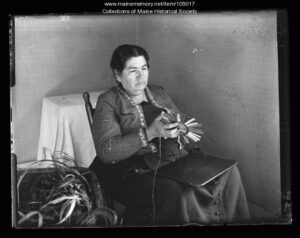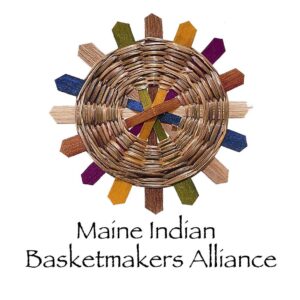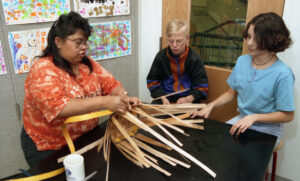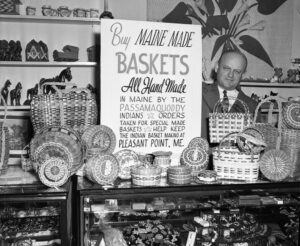Acknowledgment is a simple way of showing respect and a step toward correcting the stories and practices that erase Indigenous people’s history and culture, and toward inviting and honoring the truth.
Portland Public Library would like to acknowledge that the land on which we gather is the occupied and unceded territory of the Wabanaki, the People of the place where the sun first looks our way, who have stewarded this land throughout the generations.
We extend our respect and gratitude to the many Indigenous people and their ancestors whose rich histories and vibrant communities include the Abnaki, Maliseet, Micmac, Passamaquoddy, and Penobscot Nations and all the Native communities who have lived in Chuwabunkeag for over three thousand generations in what is now called New England and the Canadian Maritimes.
We thank them for their strength and resilience in protecting this land and aspire to uphold our responsibilities according to their example.

Title: Margaret Shay, Portland, 1923
Creator: Portland Press Herald
From the Portland Press Herald glass negative collection at Maine Historical Society
In Maine, the four remaining tribes, Maliseet, Micmac, Penobscot and Passamaquoddy are collectively known as the Wabanaki, “People of the Dawnland.” One of the main arts the Wabanaki are known for are their baskets. The knowledge of basketmaking was passed down through the generations and making baskets contributed to tribal economic security. However, due to the changing socioeconomic times (World Wars and the Depression), there was a decline in the practice in the mid twentieth century.

In 1993 the Maine Indian Basketmakers Alliance (MIBA) was formed to help promote this tribal art. Theresa Secord (Penobscot), founding director of MIBA and basketmaker speaks about the history of Wabanaki baskets in this short video.
Traditionally these baskets have been made with ash and sweetgrass.

Cheryl Lafford (Micmac), shows Jacob Goodspeed and Brooke Moreno how to make baskets in the traditional Micmac style in 1993. This photo is from the Portland Press Herald Negative Collection at Portland Public Library.
For a thirty minute video on basketmaking with Jennifer Sapiel Neptune (Penobscot) at the Hudson Museum at the University of Maine, click here.
Today the ash is under threat by the Emerald Ash Borer and their larvae have killed millions of ash trees.
For more information on current Wabanaki arts, please click here.

George E. Morong, 116 High Street, stands with a display of hand-made baskets in a local gift shop. Morong arranged the exhibit to aid the Passamaquoddy Indians at Pleasant Point. Portland Sunday Telegram, May 14, 1950. From the Portland Press Herald Negative Collection at Portland Public Library.
posted: , by Raminta Moore